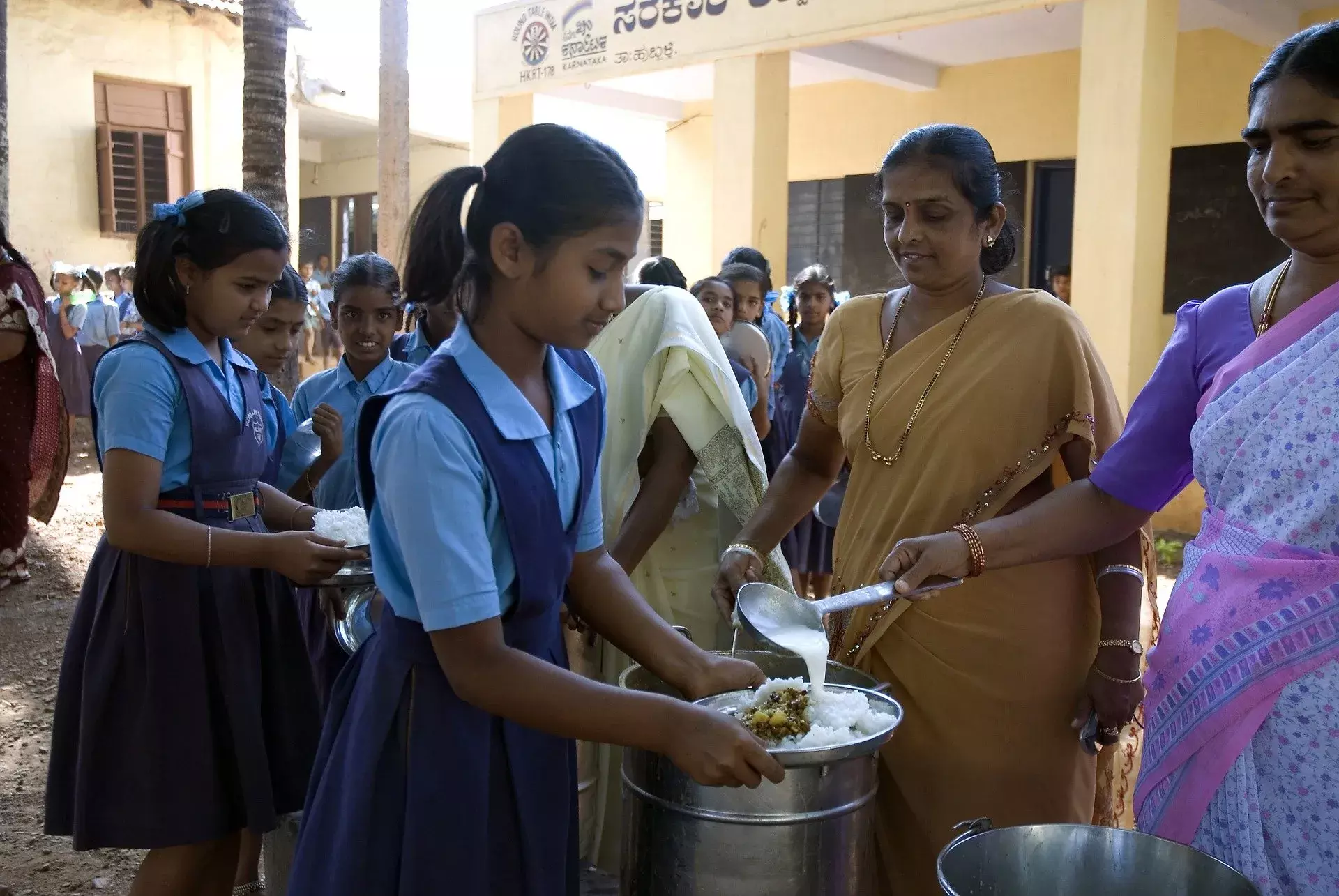PM Poshan: Does It Offer Any Extra Servings Than Mid-Day Meal Scheme?
The rechristened PM Poshan programme is reiterating benefits that already existed in various other national schemes

Picture Credit: Pixabay/Akshaypatra
The Cabinet Committee on Economic Affairs, chaired by Prime Minister Narendra Modi, on September 29, 2021 approved that the National Scheme for Mid-Day Meal in Schools will be continued under a new name — Prime Minister POshan SHAkti Nirman or PM Poshan.
Union Minister of Education Dharmendra Pradhan called this scheme Modi's intervention "to strengthen the fight against the menace of malnutrition".
FactChecker's analysis shows that most of the highlights of PM Poshan meant to "improve the efficiency and effectiveness" of the Mid-Day Meal Scheme (MDM) already existed under different government programmes or as changes that had already been announced earlier.
Let's first understand what is the new scheme and if it changes its precursor in any way.
What is PM-POSHAN
Earlier, under the MDM Scheme, children in elementary schools (Grades 1 to 8) were provided with one hot, cooked meal. Now, the PM Poshan scheme has been expanded to include children in pre-primary schools or Bal Vatikas of government and government-aided primary schools.
Over five years (2021-22 to 2025-26), the Centre has allocated Rs 54,061.73 crore (US$ 7288 million) to the new programme, while the final outlay for states and Union territories is Rs 31,733.17 crore. In addition to this, the Centre will pay about Rs 45,000 crore for foodgrains. This makes the scheme's total budget to Rs 1.3 lakh crore.
Other measures, that the government says will improve the efficiency of the scheme, include increasing community participation in the programme and providing supplementary foods in districts with high prevalence of anaemia.
Any Increase in Budget?
The allocated budget for PM-Poshan for 2021-22 is Rs 10,812 crore (US$ 1457.5 million), which is very close to the 2021-22 allocation for the MDM scheme — Rs 11,500 crore (US$ 1550 million).
No new allocations were made towards the scheme. This year the allocation was lower than the revised estimate for last year, and no additional allocations were made even after the second wave of the pandemic.
For mid-day meals, the Ministry of Consumer Affairs, Food and Public Distribution acquires foodgrains from the Food Corporation of India under the National Food Security Act (NFSA) 2013. For 2020-21, the government has budgeted Rs 40,000 crore (US$ 5392 million) for the programme, and PM-POSHAN does not make any additional outlay.
Moreover, including 24 lakh pre-primary students is unlikely to need a major change in the programme's budget requirements for two reasons: The scheme already covers 11.8 crore school-going children and even without PM-POSHAN, children below the age of six, who attend government or government-aided pre-primary schools, are entitled to a meal under the NFSA.
Any New Benefits?
The Centre-state share of the budget for the scheme has remained unchanged at 60:40 (except for north-eastern states and Himachal Pradesh, where it is 90:10, and for Union Territories, where Centre bears 100% of the cost), shows a 2015 order from the Union Ministry of Human Resource Development. Moreover, the NFSA was never amended to change the entitlements of the children.
The government announced cooking competitions, kitchen gardens and tithi bhojan under PM-POSHAN. Out of these, the concept of tithi bhoj, which refers to community members cooking meals for the students on special occasions, was discussed in 2014 by the then Women and Child Development Minister Smriti Irani.
A 2019 revision of the scheme also mentioned several measures, such as developing kitchen gardens, fortified food for combating anaemia and cooking competitions.
PM Poshan makes social audit of the scheme mandatory in all districts. But in June 2019, the Union Ministry of Education had directed all state governments to conduct social audits of the MDM Scheme to "monitor the regularity and wholesomeness of the mid-day meal served to children, cleanliness in cooking and serving of the meal, timeliness in procurement of good quality ingredients, fuel, etc., implementation of variety in menu so as to make it attractive to children and ensuring social and gender equity on daily basis".
More Beneficiaries or Amends?
Children in the pre-primary sections, who were earlier under the Women and Child Development Ministry's Integrated Child Development Scheme (ICDS), will now also be covered under the PM Poshan. But since PM POSHAN replaces these benefits, the same children, who earlier got a morning snack and a hot cooked meal under the ICDS, will now only receive a hot cooked meal. But, this does not increase the number of beneficiaries.
The new and revamped programme does nothing to address the criticisms levelled at the MDM scheme. According to an IndiaSpend report, children have died after eating food that is of poor quality or made using spurious ingredients. Eggs, which are a cheap source of protein, have been dropped from the menu in several states, depriving children of a key nutrient. There is plenty of scope for improving the food served under the scheme by adding eggs and other nutritious food, said Dipa Sinha, a professor of economics at Ambedkar University in New Delhi.
According to data the Ministry of Education provided in the Lok Sabha in 2020 shows that the number of children enrolled under the MDM scheme has been declining the past three years. "The real allocation for the scheme needs to be increased, and the government needs to investigate why the number of children covered by the scheme has fallen over time," said Sinha.


